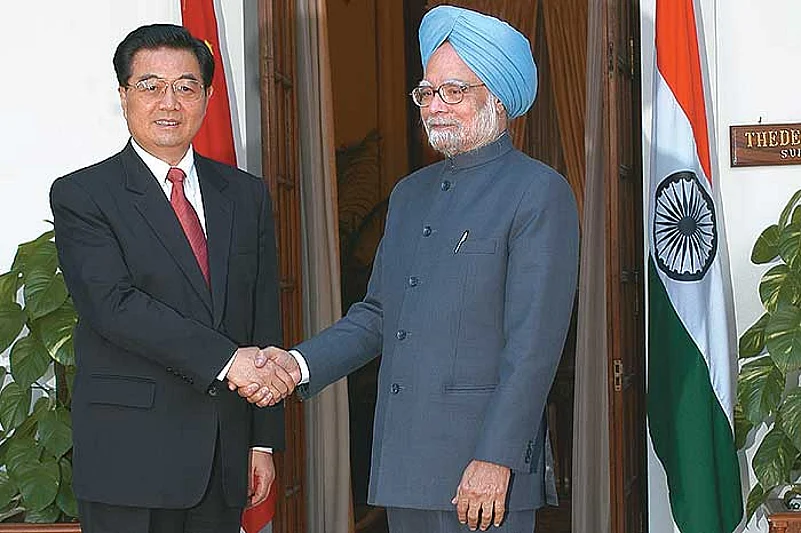The Chimes Of China
- The provocation Beijing denies visa to Lt Gen B.S. Jaswal, says his command includes "disputed J&K." Manmohan Singh talks of new Chinese assertion.
- The problem India is confused about China's intent. Relations warmed up post-Copenhagen conference. But strain surfaces again over the visa issue.
- The prognosis Is there a method to China's behaviour? Yes, say diplomats and analysts. But there are only theories, no clear-cut answers.
The motivation China sees India as a potential rival, an emerging power wishing to play a global role. So Beijing's decisions are aimed at locking India into South Asia and knocking out future competition.Therefore, through the visa issue China....
- Wants to tell the world that Kashmir remains disputed, that it's India's old problem
- Endorses Pakistan's line; inserts a hyphen between India and Pakistan.
- Is asking India to think of concessions in the eastern sector, where most of the disputed area is in India's control. Remember, Jaswal's command overlaps with the disputed western sector, where China has the upper hand.
- Plays the Kashmir card to show its disapproval of India's growing proximity with the United States.
China's other, long-term steps to box India in
- Strengthening military aid to Pakistan, helping it in its missile, nuclear programmes
- Investing heavily in building port facilities and infrastructure in Pakistan, Myanmar, Sri Lanka, Nepal and Bangladesh to expand Chinese influence in India’s immediate neighbourhood
- Increasing defence preparedness in the Indian Ocean, along the Line of Actual Control, to unsettle India
***
When China refused a visa to Lt Gen B.S. Jaswal, who heads the northern command, on the astonishing plea that his jurisdiction includes the ‘disputed’ Kashmir area, officials in New Delhi were both dismayed and perplexed. To them, it was obvious Beijing was feigning a hiccup to bring to a hurried end the months of warmth India and China had shared following their cooperation at the Copenhagen Conference on climate change. Their conclusion couldn’t be faulted—after all, Jaswal’s visit was supposed to be the sixth such military exchange between India and China beginning 2006, the year in which Chinese President Hu Jintao and Indian Prime Minister Manmohan Singh decided to initiate this confidence-building measure (CBM). What was Beijing’s sudden compulsion to disrupt this arrangement?

Lt Gen Jaswal (above, centre)
Officials in New Delhi were perplexed because they couldn’t quite comprehend, for sure, the signal Beijing was transmitting through its provocative decision of not granting a visa to Lt Gen Jaswal. A senior Indian diplomat told Outlook, “Even in the best of times, it is difficult to fathom what China is thinking. It gets worse when China is on the rise.” China’s star is surely in the ascendant—it is now the second largest economy in the world and, unlike the United States, not distracted in securing its interests worldwide, in the pursuit of its ultimate goal of world domination.
But a China on the rise is also an insecure China; it believes the world, particularly the US, will conspire to abort its ultimate quest. Should India then become the West’s Trojan horse in countering China? India, theoretically, fits the bill for that role—it too is experiencing an astonishing economic growth, entertains the desire to extend its role beyond the region, and other powers sing paeans to it. Officials in New Delhi feel China—known to think through the foggy future decades earlier—refused to grant a visa to the general as part of an exquisitely calibrated plan to bog India down in South Asia, and nix its global dreams.
Even Manmohan has joined the sceptics on China, those who look askance at Beijing’s every decision. This turnaround is surprising, for the prime minister has repeatedly talked of there being “enough space for both India and China” to grow. In an informal chat with newspaper editors this week, he’s said to have talked of China’s new assertion, its plan to keep India at a “low-level equilibrium”. This sentiment finds its echo in what foreign secretary Nirupama Rao (a former ambassador to China) told Outlook, “We do not deny the complexities inherent in the Indo-China relationship, which is an important one.” Claiming India’s approach has been to handle all outstanding issues through an “open and frank” manner, Rao added in good measure, “Every relationship has to be built by taking each other’s sensitivities into account. It cannot be a one-way street.”

China-Pakistan military collaboration
But what exactly is China’s gameplan? The Sino-sceptics have floated many theories on the visa controversy. For one, they say the refusal to grant visa was the decision of China’s People’s Liberation Army, which is keen to host generals from the eastern and not the western sector of the disputed border. Why? Since India is in possession of much of the disputed territory in the east, unlike in the west, the Chinese want to know the measures New Delhi has taken there to stabilise the Indian side of the border. But Jaswal is from the western sector of the border, where much of the disputed sreas are under China’s control. In denying visa to him, China is saying it doesn’t want to talk about the western sector. Second, through the visa controversy, China wants to convey that Kashmir remains disputed, reinsert the hyphen between India and Pakistan that the US had taken out, and entangle India in problems severe enough to prevent it from playing a role beyond the region.
However, Hu Shisheng, director of South Asia in the Beijing-based Chinese Institute for Contemporary International Relations (CICIR), insists that China always considered the Kashmir issue a dispute between India and Pakistan. China claims it has been stapling visas to the passports (instead of stamping them) of Indian nationals from J&K for a few years now, but India discovered this only last year and protested vociferously. Explains Hu, “If China stamps the visa directly on Indian passports, it will be regarded by the international community that China accepts that there is no Kashmir dispute, which is not the truth. The reason behind the Chinese practice is to not make the Kashmir issue more complicated.”

Dalai Lama in Tawang, Arunachal Pradesh
It’s also said China refused a visa to the general as an expression of displeasure with the Indian leadership’s recent engagement with the Dalai Lama. Interestingly, the Chinese decision was conveyed to the Indians around July 23-24, a week after Nirupama Rao met the Dalai Lama in Dharamshala. Another section feels the pro-US lobby in the Indian establishment stoked the visa controversy, leaking the news about the Chinese refusal to the media a month after it was conveyed to New Delhi. Its reason: raise fears about China’s intent and create a public opinion favourable for defence minister A.K. Antony to sign three pending agreements that would forge deeper Indo-US defence ties.
The visa controversy apart, the US factor does determine Sino-India relations. Prof John Garver of the Georgia Institute of Technology, Atlanta, says China began to harden its position on India because of New Delhi’s growing proximity with Washington. In 2005, says Garver, Premier Wen Jiabao entered into a strategic partnership with India; he also brought a map of China to New Delhi showing Sikkim as part of India and signed an agreement on “the guiding principles and political parameters” for resolving the festering border dispute. But then, India and the US signed a framework agreement on defence cooperation, began talks on the nuclear deal and undertook joint military and naval exercises. Says Garver, “Beijing interpreted this as a rebuff to its overtures to develop friendly relations.” It’s around this time that China began to issue stapled visas to Indian nationals in J&K, thus conveying the subtle message—what Washington can resolve Beijing can unravel.

| “India will understand that the US will never respect India. It risks losing respect from both the US and China.” Dingli Shen, Fudan University |

| “Beijing has interpreted India’s new partnership with the US as a rebuff to its overtures to develop friendly ties.” John Garver, Professor, Georgia Tech | ||

| “Misgivings about Sino-India relations are worsened by a lack of significant knowledge about each other.” Rana Mitter, Professor, Oxford Univ |

| “Every relationship has to be built by taking mutual sensitivities into account. It cannot be a one-way street.” Nirupama Rao Foreign Secretary, India | ||

| “China staples visas to passports of Indians from J&K in order to not make the Kashmir issue more complicated.” Hu Shisheng, Commentator, CICIR |
The US factor has been acknowledged by none other than former foreign secretary Shyam Saran. In a recent article in a journal, Saran notes, “The US understood that even though India could never be an ally, it would nevertheless pursue, in its own interest, policies that would create a strong countervailing presence in the region supportive of the US objectives.”
Beijing hasn’t yet come to a conclusion that Indo-US relations are aimed at curbing its influence, but have definite apprehensions about it. CICIR’s Ma Jiali, a well-known commentator on South Asia, told Outlook, “India is developing its relations with the US and so is China. But Beijing wouldn’t like to see any manoeuvering to check its rise. It wants India to follow an independent foreign policy.” Fudan University’s Dingli Shen, similarly, cautions, “India will understand that the US will never respect India. It didn’t respect India even in the past. If India does play the US game, then it will end up losing respect in both the US as well as China.”
Such comments—and controversies such as the visa one—are perceived by some as China’s attempt to unsettle India. Says Garver, “China is waging psychological warfare against India. It is trying to give a clear signal that unless India adopts a friendlier stance towards China, there could be problems.” But the word “friendlier” is essentially a euphemism for India accepting China’s superiority.

Chinese experts at Gwadar port, Pakistan (Reuters, From Outlook, September 20, 2010)
But if China suspects India’s intent, then New Delhi too is guilty of the same. It has grave reservations about Beijing’s forays in South Asia. From Nepal and Bangladesh to Sri Lanka and Pakistan, Beijing has been building ports, roads and rail links. This has led many to argue about China’s ulterior motive of encircling India, of undermining New Delhi’s influence in its neighbourhood. But such Indian analysts forget the profound truth—just as India must promote its own interests through a forging of better ties with the US, China enjoys the legitimate right to nurture its economic interests in South Asia.
These mutual misgivings stem from the fact that Indo-Sino relations are negotiated in a context of flux—a rapidly changing world. It’s made worse, says Prof Rana Mitter, a Chinese expert at Oxford University, because “a fundamental problem in Sino-Indian relations is the lack of significant knowledge about each other”. This provokes displays of insensitivity—manifest in China’s refusal to issue a visa to Jaswal. Similarly, the Indian media went to town about the debate the Chinese newspaper, People’s Daily, conducted on the possibility of China opting for a limited war with India. That the readers rejected the proposition was mentioned only in passing.
As China continues to blow hot, blow cold with India, befuddling the leadership in New Delhi, Union HRD minister Kapil Sibal and surface transport minister Kamal Nath will visit Beijing in forthcoming weeks. India, like its neighbours, wants to attract Chinese investment. Yet as the two countries seek to cooperate, there will remain persistent worries about whether they can rise simultaneously without friction.

























